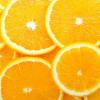
Beef and Milk
#61
Posted 22 October 2008 - 02:49 AM
#62
Posted 24 October 2008 - 04:05 AM
consume human breast milk.
I can only imagine how many "double takes" would happen in the grocery isle, if said product was available for purchase... haha.
Edited by jCole, 24 October 2008 - 04:06 AM.
#63
Posted 08 November 2008 - 09:52 PM
I drink skimed milk only, never ever fat.
I hear is not permitted for jews to have milk and meat at the same lunch and must be consumed with a minimum of time between.
It's funny sometime how religion can be so close from our personal life..... Kashrut on wikipedia.
#64
Posted 11 October 2012 - 10:11 PM
Beef and milk also are lacking in substances that promote longevity, like dietary-fiber and phytonutrients. So I don't understand why beef and milk would be included in a longevity based diet plan, especially since there are many studies showing that beef and milk causes many diseases… everything from heart-disease to diabetes (both type-1 and type-2) to numerous cancers!
Most cultures that have the best longevity are cultures that eat mostly a vegetarian type diet high in complex carbohydrates, like the Okinawans who based their diet on rice and yams.
Edited by misterE, 11 October 2012 - 10:11 PM.
#65
Posted 07 January 2013 - 07:33 PM
The problem with most milk studies is it's looking at pasteurised milk, and usually skimmed or low fat milk, nature didn't put fat and cholesterol in milk to kill babies it's vital for brain and nervous system growth. Human milk is the highest in cholesterol too
The Okinawas also ate a lot of fish and pork, and cooked EVERYTHING in lard. Ask any Japanese and they will confirm their nickname for Okinawa is 'the land of pork'.
#66
Posted 08 January 2013 - 04:20 AM
And yet the Maasi who drank nothing but milk and blood and ate nothing but meat were healthy, free of diabetes, obesity or heart disease until they started eating modern foods.
The problem with most milk studies is it's looking at pasteurised milk, and usually skimmed or low fat milk, nature didn't put fat and cholesterol in milk to kill babies it's vital for brain and nervous system growth. Human milk is the highest in cholesterol too
The Okinawas also ate a lot of fish and pork, and cooked EVERYTHING in lard. Ask any Japanese and they will confirm their nickname for Okinawa is 'the land of pork'.
The Maasi were a small population (so you are giving a small example). They may not have had any heart-attacks, but they probably had atherosclerosis (unlike the Tarahumara-indians and their crystal-clean blood-vessels, living off a starch-based diet).
Nature didn't put saturated-fat and cholesterol to kill babies, but nature also didn't expect adults to be drinking milk after weaning either. And nature surely didn't expect us to drink milk of another species!
Sure the Okinawans ate some pork and fish and probably some lard, but that was a small part of their diet. The main part of their diet (about 90% to be exact) was starch (complex-carbohydrate from sweet-potato and rice).
#67
Posted 09 January 2013 - 05:50 PM
https://www.msu.edu/...meat_table2.gif
Not to mention oestrogenic chemicals in many plants that increase our production.
#68
Posted 11 January 2013 - 03:46 AM
The amount of oestrogen in beef and milk is far less than cabbage, wheat, or soy.
Not to mention oestrogenic chemicals in many plants that increase our production.
Phytoestrogens (which come from plants) are good for you. These weak estrogens, they balance your endogenous estrogen levels and mitigate the harmful effects of bad estrogens, which is probably why phytoestrogen rich diets (plant-based diets) are known to decrease the risk of prostate and breast cancers and have been repeatedly shown to lower circulating estrogens in both men and women (by about 50%).
The estrogen in meat is actually bad estrogen (17-beta-estradiol) given to food-producing animals (cows, chickens, pigs), to increase weight and accelerated the growth process. Cow milk also naturally contains bad estrogens and it’s consumption has been strongly linked to breast and prostate-cancer as well as heart-disease.
Edited by misterE, 11 January 2013 - 03:46 AM.
#69
Posted 11 January 2013 - 04:52 PM
#70
Posted 11 January 2013 - 10:58 PM
Then the solution is to eat natural grass-fed beef.
Perhaps for the time being... but what happens when 7 billion plus people want to start eating grass-fed beef?
Grass-fed is better than commercial... but are we better with or without the beef in the first place? If you look back in history, paintings of rich aristocrats, royalty and fat kings and queens remind us that rich foods, that appeared daily on the plates of these elite, caused serious ailments; these were fat, obese, balding men with gout in the feet, probably had severe diabetes and atherosclerosis. You see paintings of them feasting on meats! And way back then, I'm sure they were grass-fed meats also.
The common folk didn't have access to meat, only on festivals and special occasions; their daily diet was starch in the form of breads, oats, barley, beans, potatoes, wheat, corn, rice, etc.

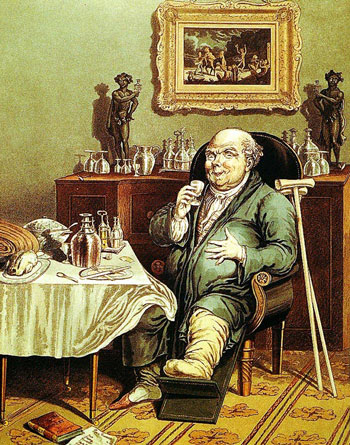
#71
Posted 14 January 2013 - 12:41 AM
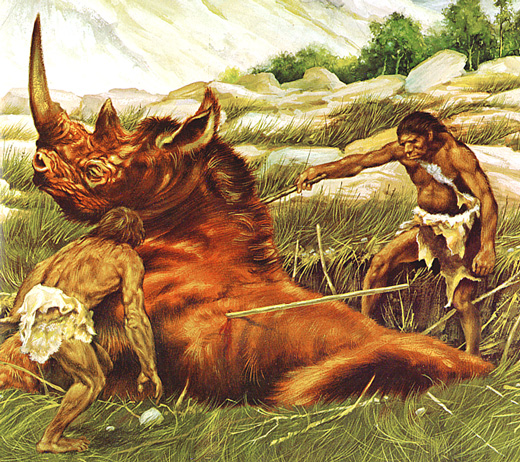
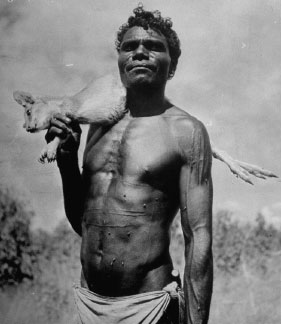
The lower classes were mostly thin because they had limited foods, aka were calorie restricted. The upper classes were fat due to an over abundance of food in general, and lack of physical labour.
#72
Posted 14 January 2013 - 03:22 AM
Our ancestors’ defiantly ate meat, but hunting is an unreliable way to obtain calories, because it is very unpredictable, unreliable and takes a lot of energy (calories) to obtain those calories. Most cultures or tribes obtained the majority of their calories from plant foods. It was the gathering that allowed the populations to survive not necessarily the hunting.
But please answer this question, because we are facing a problem that might just destroy the human race and planet Earth if we don't come up with a quick solution: So let's just assume eating grass-fed meat is the solution (like you said)... how do we make that sustainable for 7 billion and counting?
Edited by misterE, 14 January 2013 - 03:30 AM.
#73
Posted 14 January 2013 - 04:22 PM
And yet we managed to survive millions of years hunting and eventually came to be the dominant species on the planet?
Feeding 7 billion, easy. Google 'Polyface farm' by using daily rotational farming (just open up a new daily plot just big enough for all the cattle's need for one day and the cows walk across themselves), combining different animal's usefulness (follow the cattle 4 days later with chickens which eat the now huge maggots in the cow muck just before they become flies, adding protein to their diet while spreading the cow muck all over and adding their own fora more balanced manure, 6 weeks later the grass is ready to eat again!), and other techniques this farm is able to raise PER ACRE 400lbs beef, 300lbs pork, 100 chickens, 12 turkeys, 10 rabbits, 4,200 eggs in a year. this averages out to 1.1lbs beef, 0.82lbs pork, 0.27lbs chickens, and 11.5 eggs per day, enough for about 2 people (maybe more) eating just that and nothing else. And this is using really poor soil, the farming techniques turned the soil from dead to rich and vibrant!
#74
Posted 14 January 2013 - 08:14 PM
#75
Posted 14 January 2013 - 08:32 PM
#76
Posted 14 January 2013 - 11:52 PM
#77
Posted 15 January 2013 - 01:42 PM
I think ratios are less important than actual amounts. When you cut calories down from say 2200 to 1200 but keep the ratios the same then you eat less of protein, fat, and carbs. We have a minimum need for protein, about 50g or so (it varies depending on your lean mass, this is the very minimum), at 2200kcal that's only ~9% but at 1200kcal it's ~17%, quite different. So assuming protein need stays the same, it's the rest of the calories that are the biggest questions. That is should the rest come from fat, carbs, or both? Personally I do a lot better eating low carb, I do eat some potatoes and such though, sometimes ~55g carbs a day and find this means I can eat more calories and still loss/maintain my weight. That is the carbs cause more weight gain for me than fat does. I also tend to eat more protein as I eat less carbs, the less carbs you eat you need slightly more protein, as protein can be converted to carbs slowly so act like a very very low GI carb in a way, but you're glucose requirement for the brain goes down when in ketosis (eating a low carb diet) from about 120g per day down to ~36g per day. So at 1600kcal, and 95g protein, 52g carbs, 113g fat, this is 25%, 13%, and 62% of calories respectively. Which is a kind of shuffle of your ratios :P
Anyway, I made a little spreadsheet to work out how the protein, carb, and carbs relate to each other to work out how much you need of each depending on either your total or lean mass and exercise; specifically how much carbs you need to eat for your brain depending on the protein/fat eaten and if you're in ketosis or not. It's quite nifty (well I would think so). So I put in 110lbs lean, 95g protein and 113g fat and it calculates I need ~7g of carbs in my diet, so I could cut back on the potatoes and still be fine. Assuming you're eating 1200kcal and same lean mass (please correct me if not), 15/61/24% is 45/183/32g P/C/F, then this works out to 137g carbs needed in the diet, so you're eating enough at 183g. But it also says you're getting getting the basal protein need at 110lbs lean (this is ad sedentary too), at 110lbs you need minimum 65g protein...
Hope that makes sense to you. I can send you the calculator if you'd like to have a play with it.
#78
Posted 15 January 2013 - 08:10 PM
#79
Posted 15 January 2013 - 09:04 PM
#80
Posted 16 January 2013 - 02:26 PM
Of the whole animal only about 25-35% of the protein is gelatin. Muscle meat is also low in PUFA, even grain-fed, grass- and grain-fed have the same amount of omega-6, but grass-fed has more omega-3 and CLA. But I would say meat does have a good amino acid profile, when combined with some gelatin, and would best match our own body's amino acids as you are indeed eating another body. Vegetarian protein sources need to be combined to match that of meat/our bodies.
Johnross47,
Do you know your body fat %? Fish is good, read quite a few studied that when meat and fish eaters are separated and compared with vegetarians that the fish eaters seem to do slightly better, Denise discusses this on her blog, I think in the Forks Over Knives review.
I would think the less animal foods you eat it's a good idea to eat the more nutrient dense animal foods, similar to what Denise (rawfoodsos.com) does. So liver and other organs, egg yolks, shellfish, gelatin-rich broth, cod liver oil, etc, in addition to lots of vegetables, but also limiting fruit (too much sugar).
#81
Posted 16 January 2013 - 02:51 PM
#82
Posted 16 January 2013 - 11:51 PM
If you look at the actual data of the china study, it's wheat that's bad, not meat
"It's not the greasy double-bacon cheese-burger... it's the starchy wheat-bun"--yeah right!
The China-Cornell Study was the largest epidemiological study ever conducted in regards to diet and its relationship to health and longevity. Of course the study found eating foods of plant origin promoted health and foods of animal origin caused diseases of affluence. This is nothing new thou; if you go and read the bulk of the scientific-literature it clearly promotes a plant-based diet as well, and it overtly condemns meats and fats. If you look around the world, third-world countries that eat a primarily low-fat plant-based diet are thin and absent of diseases that plaque Westerners. Contrary, rich wealthy countries that eat lots of meats, cheese, oils and sugar, have an epidemic of obesity and other serious dietary related diseases.
It has been well documented that when these healthy citizens migrate from their third world country to the USA, they end up eating less starch and more animal-fat and refined-sugar [1-3]. The consequence of this dietary-change causes the body to become unresponsive to insulin and when that happens, you begin to develop metabolic-syndrome, which predisposes you to numerous diseases and aliments and rapidly ages your body.
Looking back at the records, Americans were fairly healthy back in 1910, but as of 2007 we had a epidemic of heart-disease, diabetes, obesity, cancer and alzheimer’s... the dietary change that took place during those 97 years was a huge decrease in whole-grains, flour, beans and potatoes and a large increase in meats, dairy, total-fat and total-sugar [4-5].
The evidence is crystal clear, it's as clear as Dr. Dean Ornish's blood vessels even: if you want to be healthy, eat a diet centered on whole-grains, beans and potatoes, with vegetables on the side and fruit as a desert. Keep rich-foods (meat, dairy, fats/oils and simple-sugars) to a minimum. And eat nuts, seeds, avocadoes and olives in moderation (due to their caloric-density and high-fat content).
Combine that with exercise, sunshine and some fasting... and you got yourself the best anti-aging regimen there is!
[1] J Diabetes. 2011 Dec;3(4):278-92. Nutrition transition in India: secular trends in dietary intake and their relationship to diet-related non-communicable diseases. Misra A, Singhal N, Sivakumar B.
[2] Diabetes Care. 1979 Mar-Apr;2(2):161-70. Diabetes mellitus and its vascular complications in Japanese migrants on the Island of Hawaii. Kawate R, Yamakido M, Nishimoto Y.
[3] Asian Pac J Cancer Prev. 2004 Jan-Mar;5(1):28-35. Association between type II diabetes and colon cancer among Japanese with reference to changes in food intake. Kuriki K, Tokudome S, Tajima K.
[4] Am J Clin Nutr January 1959 vol. 7 no. 1 91-97. The American Diet—Past and Present. Trulson MF.
[5] Am J Clin Nutr. 2010 May;91(5):1530S-1536S. Trends in food availability, 1909-2007. Barnard ND.
Edited by misterE, 17 January 2013 - 12:12 AM.
#83
Posted 17 January 2013 - 12:01 AM
Diet is really a problem; there's too much contradictory information going around.
Just ask yourself this: what did people eat in biblical times? What did people eat before refrigerators? Or what did roman soldiers eat when marching to battle? What do cultures with the best longevity eat? Whole-grains of course! Without the health and life promoting effects of whole-grains and other starches, there would be no civilization period; we would not be here typing away on our computers.
#84
Posted 17 January 2013 - 12:10 AM
Vegetarian protein sources need to be combined to match that of meat/our bodies.
But make no mistake. Plant-proteins are complete-proteins. Plant-proteins may be even superior to animal-protein in regards to health and longevity [1-2]. Too much "high-quality" animal-protein increases IGF-1 (which can accelerate cancer growth) and it also travels with animal-fat and cholesterol.
[1] Med Hypotheses. 1999 Dec;53(6):459-85. Vegan proteins may reduce risk of cancer, obesity, and cardiovascular disease by promoting increased glucagon activity. McCarty MF.
[2] Med Hypotheses. 2009 Feb;72(2):125-8. The low-methionine content of vegan diets may make methionine restriction feasible as a life extension strategy. McCarty MF, Barroso-Aranda J, Contreras F.
Edited by misterE, 17 January 2013 - 12:15 AM.
#85
Posted 17 January 2013 - 01:17 PM
In biblical times, grains were seen as famine food, and meat, especially fat was praised. God said to give him the fattest cuts from a sacrifice because the people were eating those himself and he wanted the best bits, as that was the point of picking the best animals too. They certainly weren't vegetarians or vegans, they eat a lot of fish, and they didn't restrict fats either was olive oil was used with everything including the bread. In fact there are several parts of the bible that say that vegetarianism is dangerous! When in the book of Daniel they ate a vegetarian diet and remained healthy this was used as proof of god's work, that is without god using them for miracles they would've suffered, that is that being healthy on such a diet was considered a miracle itself!
More: http://www.biblelife.org/biblediet.htm
Is it too much animal protein or too much protein in general that is the problem? I agree that via mTOR and other pathways, too much protein is bad for us. But I very much disagree with your implications that saturated fat and cholesterol are bad for us. Both are absolutely vital for life! Dietary and blood cholesterol have very little link, in the whole blood there is about 10 whole grams of cholesterol (200mg/dl = 10g/5l) which is NOTHING compared to a few milligram from a bit of meat. I could use the exact same argument to say you should avoid all dietary carbohydrates as the former raises the latter, high blood levels are toxic (glycation), and so we should limit ourselves to only 150mg of carbs a day (300mg dietary cholesterol / 200mg/dl blood = 150mg dietary carbs / 100mg/dl blood glucose). Saturated fats are actually the safest fats, as they are the most stable, they can't form transfats which need double bonds, and neither can they form nasty by-products (forget the specific name atm), which also require double bonds to open up and link onto. All that can happen with saturated fats are that they are burned for energy. PUFA, especially omega-6 fatty acids, are highly inflammatory! Much worse for us than saturated fats! Omega-6 content in human body fat and breast milk has been sky-rocketing over the last few decades from use of vegetable oils rather than animal fats (as vegetable oils hadn't been invented).


................
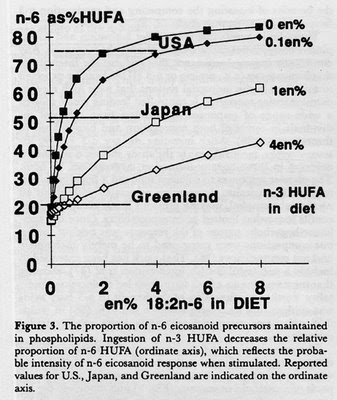

#86
Posted 17 January 2013 - 10:14 PM
I'm just working my way through her critique of Forks over Knives.....even more interesting and revealing.
#87
Posted 17 January 2013 - 11:51 PM
What I do use;
Olive oil and rice bran oil.
Large portions of all veg and fruit.....some days only veg.
Fish of all sorts including sardines twice a week and other fish as available.
Small amount of meat, mostly chicken and sometimes game, a small amount of red meat .....not every week.
#88
Posted 18 January 2013 - 03:54 AM
Then why do so many vegans seem to keep dying of heart disease and cancer (especially bowel) so young?
There is no research studies that suggest that remark. Studies have been done by doctors Caldwell Esselstyn and Dean Ornish showing reversal of atherosclerosis and prostate cancer in living humans when following a diet low-fat/high-fiber complex-carbohydrate vegan diet.
Asia has recently started eating a lot more wheat and so too have their 'western' diseases been increasing. Yeah but they’re not eating whole-grain wheat-berries, they’re eating wheat in the form of hamburger buns, hot-dog buns, cookies, cakes, processed junk foods like pop-tarts. They are abandoning their traditional starch-based diet (rice and vegetables) for the rich Western-diet (animal foods, processed-foods) and there are many studies showing this trend, not only in China and Japan, but also in India.
In biblical times, grains were seen as famine food, and meat, especially fat was praised.
Grains were “common-man” food; foods that were eaten as a daily staple. Meat and fat was seen as delicacy, only to be eaten maybe two or three times a year at most, if lucky. The only people who could afford to eat meat and fat on a daily basis were the royalty and aristocrats, the pharos and the high priests.
{1}They certainly weren't vegetarians or vegans, they eat a lot of fish, and they didn't restrict fats either was olive oil was used with everything including the bread.
{2}In fact there are several parts of the bible that say that vegetarianism is dangerous!
{3}When in the book of Daniel they ate a vegetarian diet and remained healthy this was used as proof of god's work, that is without god using them for miracles they would've suffered, that is that being healthy on such a diet was considered a miracle itself!
{1} True, but you have to agree that grains and starches were their main food source, fish, oil and wine were a small part.
{2} Where? Most major religions promote a plant-based diet. Hinduism, Buddhism claim that being vegetarian is to step into the stream of nirvana and that eating animals will cause karmic consequences.
{3} The book of Daniel clearly explains that eating rich food makes you sick and that a plant-based diet cures you. Daniel and his men got sick because they were feasting on the kings food (meat and wine), and Daniel and his men decided to go on a diet of pulses and water. Low and behold they got well and looked much healthier.
But I very much disagree with your implications that saturated fat and cholesterol are bad for us. Both are absolutely vital for life!
Why, there is a ton of research showing that saturated-fat causes insulin-resistance. Saturated-fat is unessential-fat; it is not an essential-fatty acids (EFA) like omega-3’s, therefore it is unessential for life. Cholesterol is a hormone, the body makes all it needs on its own… it is not a nutrient.
Saturated fats are actually the safest fats
Citation please? Studies show replacing saturated-fat with unsaturated-fat improves insulin sensitivity [1-2]
[1] Diabetologia. 2001 Mar;44(3):312-9. Substituting dietary saturated for monounsaturated fat impairs insulin sensitivity in healthy men and women: The KANWU Study. Vessby B, Uusitupa M, Hermansen K.
[2] Diabetologia. 2002 Mar;45(3):369-77. Substituting dietary saturated fat with polyunsaturated fat changes abdominal fat distribution and improves insulin sensitivity. Summers LK, Fielding BA, Bradshaw HA
they can't form transfats
Trans-fat are unsaturated-fats that have been converted into saturated-fats (vegetable-oil to margarine).
PUFA, especially omega-6 fatty acids, are highly inflammatory!
Agreed, omega-6 and saturated/trans-fats are the bad fats, omgega-3 is the good fat, and monounsaturated is neutral in small amounts and bad in large amounts.
#89
Posted 18 January 2013 - 09:16 PM
".The China-Cornell Study was the largest epidemiological study ever conducted in regards to diet and its relationship to health and longevity. Of course the study found eating foods of plant origin promoted health and foods of animal origin caused diseases of affluence. This is nothing new thou; if you go and read the bulk of the scientific-literature it clearly promotes a plant-based diet as well, and it overtly condemns meats and fats. If you look around the world, third-world countries that eat a primarily low-fat plant-based diet are thin and absent of diseases that plaque Westerners. Contrary, rich wealthy countries that eat lots of meats, cheese, oils and sugar, have an epidemic of obesity and other serious dietary related diseases.
It has been well documented that when these healthy citizens migrate from their third world country to the USA, they end up eating less starch and more animal-fat and refined-sugar [1-3]. The consequence of this dietary-change causes the body to become unresponsive to insulin and when that happens, you begin to develop metabolic-syndrome, which predisposes you to numerous diseases and aliments and rapidly ages your body."
It is also a fact that the same people who ate the traditional Mediterranean diet ate a lot of cheese and in many areas a lot of yogurt. While many recipes were largely or entirely vegetable they often involved huge amounts of olive oil and the small meat content was mainly fatty goat or sheep meat. As for the China Study.....having read Denise Minger's comments I am appalled it is still being promoted.
#90
Posted 20 January 2013 - 09:58 AM
monounsaturated is neutral in small amounts and bad in large amounts.
Which is why the Mediterranean diet with all its olive oil has people dying left and right. Riiight.
1 user(s) are reading this topic
0 members, 1 guests, 0 anonymous users





































